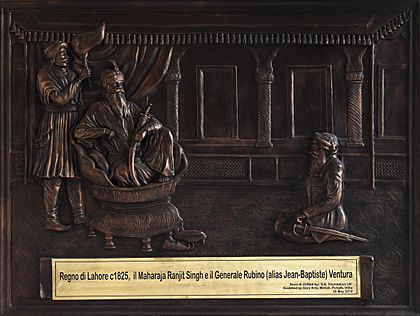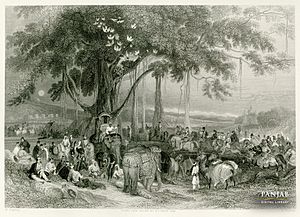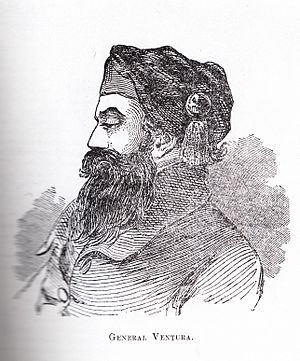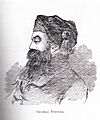Jean-Baptiste Ventura facts for kids
Quick facts for kids
Jean-Baptiste Ventura
|
|
|---|---|
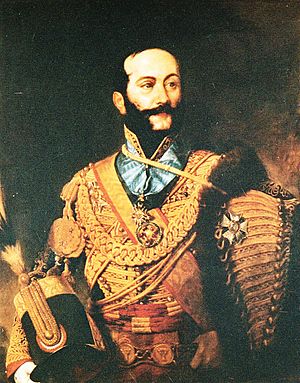
Oil painting of Jean-Baptiste Ventura
|
|
| Birth name | Rubino Ventura |
| Born | 25 May 1794 Finale di Modena, Duchy of Modena |
| Died | 3 April 1858 Lardenne, France |
| Allegiance | |
| Rank | Governor of Lahore |
| Awards | Legion of Honour |
| Spouse(s) | Anna Moses |
| Children | Victorine Ventura (daughter) |
Jean-Baptiste Ventura (born Rubino, May 25, 1794 – April 3, 1858) was an Italian soldier. He became a general in the army of Maharaja Ranjit Singh in India. Ventura was also one of the first people to study ancient sites in the Punjab region of the Sikh Empire.
Contents
Early Life and Adventures
Jean-Baptiste Ventura was born in Finale di Modena, Italy. His birth name was Rubino. His father, Gavriel Massarani, was a Jewish merchant, and his mother, Vittoria Massarani, was Catholic. The name Ventura comes from "Buonaventura," which means "good fortune" in Italian.
When he was 17, Ventura joined the army of the Kingdom of Italy. He later served with Napoleon's powerful army, called the Grande Armée. After Napoleon's rule ended in 1814, Ventura returned home.
However, in 1817, Ventura had to leave Italy. He had strong beliefs that supported Napoleon and the idea of revolution. This caused problems with the local police. He first went to Trieste, then to Constantinople (modern-day Istanbul), where he worked with ships. He changed his name to Jean-Baptiste to hide his Jewish background.
Journey to Persia
Ventura soon learned that Persia (modern-day Iran) was looking for European soldiers. He joined their army as an officer. He helped train the Shah's (king's) army using European military methods. He quickly became a colonel.
After the Shah died in 1822, Ventura offered his skills to the new ruler. But some English officers in the Persian army did not like the French. They saw Ventura as French because he had fought for Napoleon. Because of their actions, Ventura was dismissed from the Persian army.
Serving the King of Punjab
Ventura traveled further east and arrived in Lahore, India, in 1822. He was with another French officer, Jean-François Allard. They joined the army of Maharaja Ranjit Singh, the King of Punjab. The Maharaja wanted to make his Sikh Khalsa Army more modern. He welcomed soldiers who had fought in Napoleon's European wars.
In March 1823, Ventura and Allard led the Maharaja's troops in the Battle of Nowshera. They defeated the Afghan army and captured the city of Peshawar. Ventura also led several difficult campaigns. These battles helped expand the borders of the kingdom of Punjab.
Modernizing the Sikh Army
Ventura, along with Jean-Francois Allard, Paolo Avitabile, and Claude Auguste Court, were important European officers. They helped modernize the Sikh army. Ventura commanded a special brigade called the Fauj-i-Khas, which was trained like European armies.
Maharaja Ranjit Singh highly respected Ventura. Besides being a General, Ventura was also made a Qazi (Supreme Judge) and the Governor of Lahore. He quickly became a very important leader in the Maharaja's court.
Ventura married Anna Moses, an Armenian lady, in Ludhiana. They had a daughter named Victorine. Even though he was successful in India, Ventura always hoped to return to his home country.
Ventura's Archeological Discoveries
Ventura was an educated and curious man. He spent his free time exploring ancient sites. In 1830, he was the first person to explore a stupa (a Buddhist mound) at Mankiala. He found many old coins and relics there. Some of these items are now displayed in the British Museum in London.
While in Peshawar, he also dug up Bactrian, Greek, and Kushan coins. He found these coins in Hindu temples and Buddhist stupas in the Khyber Pass. He sent his findings to the Asiatic Society of Bengal in Calcutta.
Ventura served Maharaja Ranjit Singh faithfully. He also served the Maharaja's successors: Kharak Singh, Nau Nihal Singh, and Sher Singh. After Maharaja Sher Singh was assassinated in September 1843, Ventura left Punjab.
Later Life and Legacy
After leaving India, Ventura went to France. He gave King Louis Philippe a collection of ancient Greek coins he had found. These coins helped prove that Alexander the Great had marched through Afghanistan and the Punjab region of ancient India.
In his later years, Ventura lost some of his wealth in business ventures that did not succeed. He passed away on April 3, 1858, in Lardenne, near Toulouse, France.
Awards and Monuments
In 1835, King Louis Philippe I of France awarded Ventura the French Legion of Honour. This is a very high award for military service.
On May 26, 2019, a monument was put up in Ventura's honor in his hometown of Finale Emilia. The Sikh community donated this monument. It is a bas-relief (a type of sculpture) that shows Ventura with Maharaja Ranjit Singh. It was sculpted in India.
Images for kids
 | John T. Biggers |
 | Thomas Blackshear |
 | Mark Bradford |
 | Beverly Buchanan |


